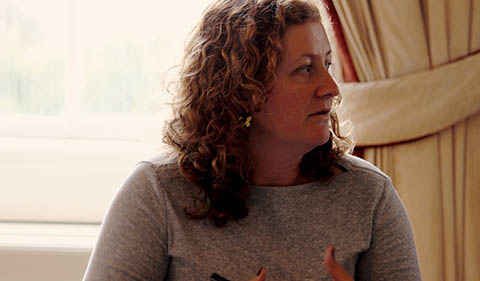
Dr. Smoki Musaraj presenting at the 2016 Wenner-Gren Foundation Symposium in Sintra, Portugal. Courtesy of the Wenner-Gren Foundation.
Dr. Smoki Musaraj, Assistant Professor of Anthropology at Ohio University, presented a paper at the Wenner-Gren Foundation Symposium in September 2016 at Tivoli Palacio de Seteais in Sintra, Portugal.
Musaraj presented the paper “Corruption, Right On! Hidden Cameras, Cynical Satire, and Banal Intimacies of Anti-corruption.” The paper examines the rising popularity of an investigative television program in Albania that exposes everyday acts of corruption—in the courts, in the ministries, in police units—through the use of sting operations and a genre of cynical satire. In her paper Musaraj explores the effects of this unlikely anti-corruption agent by drawing attention to its narratives of corruption, its technologies of investigation, and its genres of representation.
Wenner-Gren Symposia are week-long workshops that involve a small group of invited scholars who meet for intensive discussion and debate. This year’s symposium, organized by Sarah Muir (Barnard College, Columbia University) and Akhil Gupta (University of California, Los Angeles), focused on the theme of “The Anthropology of Corruption.” The symposium gathered together pioneering scholars working on corruption from a wide range of perspectives. The meeting aimed both at a stock-taking of where the anthropology of corruption has reached and, more importantly, as a place from which to generate new ideas for future research.
Abstract: The satirical investigative television show Fiks Fare [Right On!/Exactly] airs immediately after prime-time news at a leading national broadcasting network in Albania. Through sting operations and cynical satire, the show tells the raw story of everyday experiences of corruption in Albanian society—from daily interactions with low-level public administration officers to the backroom deals of high-level officials. Over the years, Fiks Fare! has endured as an effective whistleblower in a country notorious for a lack of prosecutions and convictions of corruption charges. In this paper, I explore the effects of this unlikely anticorruption agent by drawing attention to its narratives of corruption, its technologies of investigation, and its genres of representation. I argue that, through its use of sting operations and mass-mediation, the show constructs specific publics and subjects—victims, intermediaries, witnesses—that engage in everyday corruption. Second, through its use of a genre of cynical satire and vulgar aesthetics, the show constructs a political commentary and critique that makes visible the intimacies of corruption and the normalized complicity of ordinary people with figures of power.
Musaraj also presented at the American Anthropological Association’s meeting in Minneapolis in November 2016. She co-organized the panel “Properties of Speculation and Debt” (with Sean Mallin, University of California-Irvine) and presented the paper “Speculating in Kind: Klering Payments and the Socialization of Risk in Albania’s Construction Boom,” in which she discusses recent findings from her ongoing ethnographic research on construction and housing in Albania, conducted during the summers 2015 and 2016 and funded in part by a Ohio University Research Committee award.
Abstract:
Since the early 2000s, developers and subcontractors in Albania have financed an ongoing construction boom through widespread non-liquid forms of payment and credit, locally known as klering (clearing/barter). Financing through klering typically involve payments in (future) apartments rather than liquidity (cash or credit). This practice has been especially prevalent in urban peripheries; these neighborhoods are now notorious for their higher vacancy rates and lower-quality housing. In this presentation, I explore how klering practices restructure relations of credit-debt and redistribute risk among various social groups and individuals (developers, subcontractors, construction work-teams). Focusing on neighborhoods at the periphery of the capital, Tirana, I note that klering financing has contributed to a speculative economy of construction there. But rather than driven by financialization of real estate markets (as is the case in other instances of urban construction booms), I argue that this speculative economy in Tirana is sustained by a widespread socialization of risk combined with a fragmented local governance.

















Comments